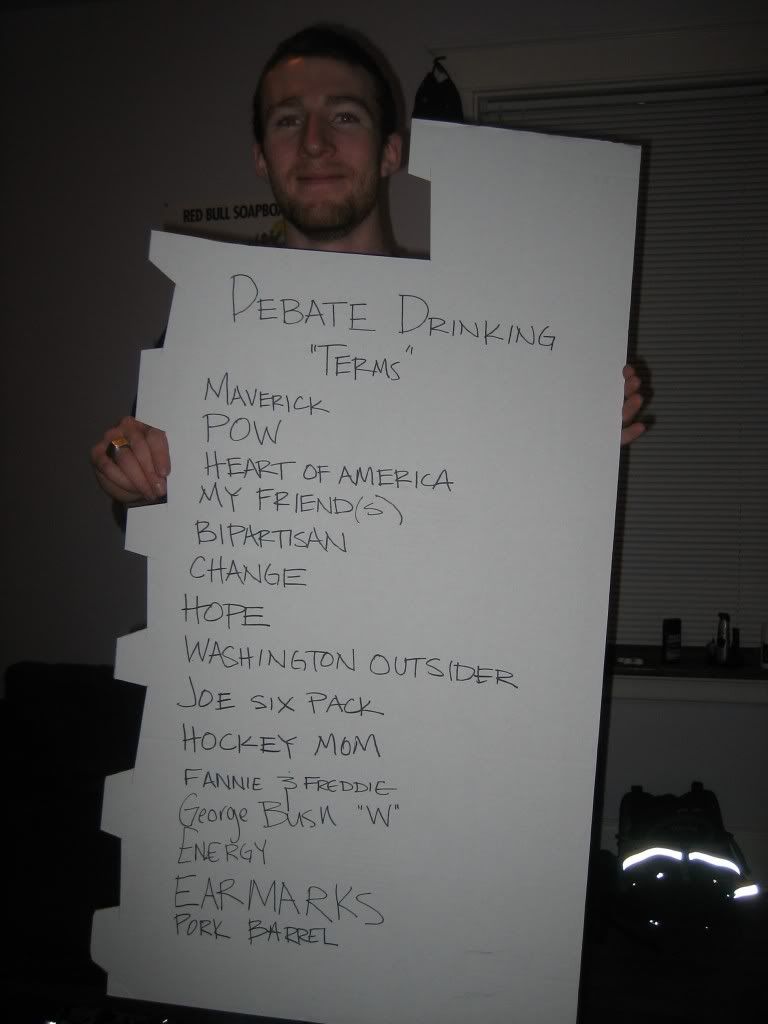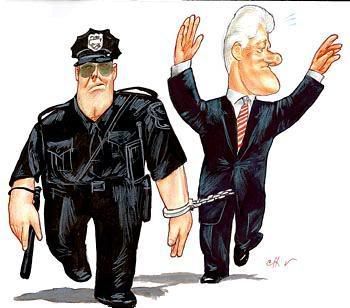
It seems in our culture today that we focus endlessly on politicians as the butt of jokes. We all know they make it extremely easy through the affairs with prostitutes, bad grammar, and poor political choices. The families of the politicians are sometimes affected. There is great humility involved. One reason why we pick them as the object of our humor may be that behind all of their political fakeness, they really are people. It seems sometimes through all of the campaigning that it is hard to imagine them as human. This makes it easy to forget that they make mistakes just like the rest of us. Many of these jokes can be seen late night on television. SNL, Jay Leno, and The Colbert Report are a few examples that everyone knows will make fun of any political event that comes our way. It is a way for society to point out that the politicians are, more often than not, terrible role models. America loves to point out all of the absurdities that are presented to us through politics.
We have seen politics and humor together in class through the literature and the theorists.
Politics and Humor Theorists Approach
Sigmund Freud’s definition of humor and jokes allows us to form a basic framework for why the political can seem humorous. Jokes on political subjects are generally of a tendentious nature. This means that they serve an aim or purpose for the teller of the joke. Cynical jokes are jokes directed at an institution. We make jokes about the political because the only way we can make fun of the political through humor. Using humor to mock institutions allows us to evade restrictions that society would normally place on us.

In a slightly different twist, Thomas Hobbes defined humor as egotistical mechanism that fit perfectly in line with his theory that man always acts out of self-love. Laughter is a way of expressing power over another. “Laughter is self-applause” where I laugh when “I can see the point and thus appreciate my superiority” (Ewin 30). In this way, we use humor to feel power over political figures that would normally have a large advantage over us. We feel a fleeting superiority over those who we laugh at. “Joy, arising from imagination of mans own power and ability, is that exultation of the mind” which causes one to feel a sense of security (Hobbes 42).

Henri Bergson claimed that humor intends to humiliate. This humiliation, “snubbing,” works as a social corrective. In this way, when a politician steps out of line, we collectively humiliate that person to try to bring them back into the fold of normalcy. Additionally, Bergson claims that laughter is purely cerebral. “Its appeal is to intelligence, pure and simple” (Bergson 2). In order to laugh at a situation, one must be emotionally detached. This is how we can find humor in situations that involve conflict where laughter might, at first, seem inappropriate.
The Effect of Living Backwards
The use of politics and humor can be seen in literary works such as The Effect of Living Backwards, by Heidi Julavits. Even though the story mainly revolves around the relationship between two sisters, there is a part of the book that involves the hijacking of an airplane. The hijacking by two terrorists is mentioned by the author in comparison to “The Big Terrible”. Many readers would relate such an instance to the traumatic political event of 9-11. Julavits started writing The Effect of Living Backwards before September 11th, and for that reason, had to make several changes in her story after the event. Julavits still chose to keep the hijacking scene in her story although she had to be especially sensitive to mentioning a terrorist attack in her book. Therefore, it is not irrational to believe there is significance in Julavits portraying a terrorist attack in her story in order to convey a message to her readers. Julavits used the idea of terrorism as a metaphor for the relationship between two sisters. Not until after their own “Big Terrible” do the sisters find a greater appreciation for each other and also search for a deeper meaning of who they are. These ideas are strongly related to the feelings of U.S. citizens after the terrorist attack of September 11th. During a time of crisis, our country’s people were focusing on what is most important in life, such as family and friends, and searching for answers as to why things happen. Just as the hijacking made the relationship of the sisters stronger, the event of 9-11 made the United States stronger. In some ways, Julavits was using a catastrophic political event in order to convey a deeper message that many of her readers could relate to from their own experiences with 9-11.
Carnivore Diet
Another comical literary piece which vaguely mentions political elements is in Carnivore Diet by Julia Slavin. The father in the story was involved in politics and was sentenced to three years in jail because of illegitimate actions during his time in Congress. There was political controversy in the story, and it appeared the father was set up in a scandal. Other characters involved with politics were portrayed as being deceitful individuals. Also the political controversy in this story affected the families, and caused problems as information was spread throughout the suburban community. The wife and the son of the man who was imprisoned had to deal with negative social pressures in their neighborhood caused from the political mishap. Readers could see the affects of political controversy in the lives of politics and their families.
Willful Creatures: Dog Days
Another example of politics and humor is in the short story, “Dog Days”, by Aimee Bender, in which readers can see the effects of a war on a society. The story is about a real man who acts like a dog, and is ultimately treated like a real pet dog by a middle-class American. However, it is mentioned that a war is going on and the economy is falling apart. People in the neighborhood are disappearing and resources become more and more scarce. The family who has taken in the “dog” actually ends up killing it in the end because of their need for food as a means of survival. The fact that a war was going on and the society was falling apart drove the dad of the family to an outrageous behavior of killing a man and justifying his action by stating he was just an animal. The author’s intentions may have been to use absurdist humor show the potential for how outlandish people in societies can act during extreme difficulties such as political events like war.
In several literary pieces we have read this quarter, authors vaguely mention political elements in their writings. This is not merely an unintentional occurrence but rather a method to convey deeper messages relating to today’s political matters. Politics have a large impact on the way in which our society functions and writers use political elements to relate readers and their societies through the context of humor. Many of the literary works which are known for their use of humor are not created solely for laughs and entertainment but the stories are meant to communicate a hidden and deeper meaning. This allows writers to indirectly get their points across about political affairs and various issues that are left for the reader to unfold.
Overall, the use of satire in politics is a useful and popular method in today's society. We are surrounded with such humor, whether it is seen in different publications, like books and news articles, or through the media. Some television shows make millions of dollars off the humor that many Americans find in political humor. This humor can be used to convey both comical and serious messages. Also this specific humor can be related to philosophers and their theories of why humor is used. In most cases, political humor is simply a way for Americans to express their beliefs freely to others about political matters.

Lauren, Jeremy, and Brittany
Works Cited:
Bender, Aimee. Willful Creatures. New York: Anchor Books, 2005.
Bergson, Henri. Laughter: an Essay on the Meaning of the Comic. Not copyrighted.
Ewin, R. E. “Hobbes on Laughter.” The Philosophical Quarterly Vol. 51, No. 202 (Jan., 2001): 29-40. Jstor. 10 May 2008.
Hobbes, Thomas. The Leviathan. England: 1651.
Julavits, Heidi. The Effect of Living Backwards. New York: Berkley Books, 2003.
Slavin, Julia. Carnivore Diet. New York: W. W. Norton & Company, 2005.
3 comments:
I like the connection you guys used to humor and politics. In the effects of living backwards I think it talked alot about politics. I wouldnt be able to write a book like this and try to add humor into it just because it happened in real life and people are still on edge. But it really makes you stop and think.
-Sharonda-
A very strong posting, Lauren, Jeremy, and Brittany. Thanks! You do a really nice job of articulating not only why we, as Americans, find it particularly easy to “make fun” of our politicians, and you point to the psychology beneath it all. You write, “In this way, we use humor to feel power over political figures that would normally have a large advantage over us.” This observation is an excellent one, and true. Humor has the power to “cut down” others in ways that can be both humiliating and gratifying (to the person who feels a sense of powerlessness).
You do a particularly nice job of summarizing and relating the core ideas of some of our theorists to the arguments you make, and you do an excellent job of narrowing down three writers from our syllabus that you wish to discuss in relation to this general theme.
An excellent observation: “In order to laugh at a situation, one must be emotionally detached. This is how we can find humor in situations that involve conflict where laughter might, at first, seem inappropriate.” Bingo. This reminds me of some of the television sitcoms surrounding an event like 9/11, or even the horrific photos of prisoners being tortured while the torturer looks on laughing. Through emotionally detaching, too, one can critically assess a situation in a way they might not have been able to, were they too close to the event. Consider a show like The Daily Show—although it does make fun of many political happenings, it is socially critiquing them as well.
You write, “In several literary pieces we have read this quarter, authors vaguely mention political elements in their writings. This is not merely an unintentional occurrence but rather a method to convey deeper messages relating to today’s political matters.” I agree. In fact, it would seem that all of the writers from this quarter use humor to address something that is deeper than the humor—or something unspeakable without using humor.
Great use of multi-media. I like the picture of Jeremy holding the “Key Phrases.” Thanks for your work and ideas!
Your insights were invaluable! Eagerly anticipating your future content!
Discover Visionary Wire
Post a Comment